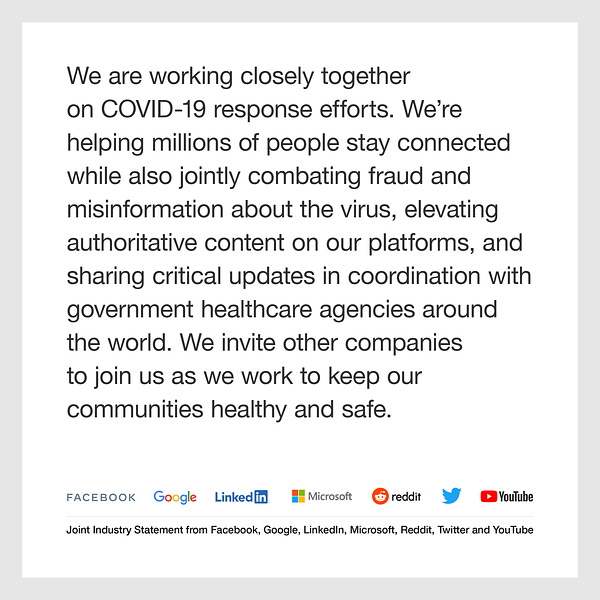Last week, I had discussed the increasing importance of platforms in our lives and economic activities around us. Though the focus was mostly on negative social impact of platform businesses but the previous issues have also discussed leveraging the power of platforms for tackling societal impact issues. I also received insights about the role of platforms when we are tackling the COVID-19 problem and how we could emerge out stronger as individuals and platforms.
See you on the other side.
DTW
During the Week, there were more cases discovered of covid-19 and hence more stringent measures have been taken including closures of public places. The present crisis has to be fought at two levels- One, tackling the spread of virus and two, containing spread of false information. And platform businesses can play a role in both of them.
It is interesting to note that around Dec. 30 2019, artificial intelligence platform BlueDot picked up on a cluster of “unusual pneumonia” cases happening around a market in Wuhan, China, and flagged it.
And all of this was based on natural language processing and machine learning to cull data from hundreds of thousands of sources, including statements from official public health organizations, digital media, global airline ticketing data, livestock health reports and population demographics.
This was nine days earlier than WHO declaring emergence of a novel coronavirus and now known as SARS-CoV- 2 causing covid-19.
The next phase of the information wars is related to the flow of information on internet. Taking advantage of relatively censored information coming out of China multiple bad players started sharing rumours and incorrect information about the epidemic. This resulted in multiple cases of racial hatred, xenophobia and acts of violence against Asian origin people. Multiple fraudulent business propped up on Amazon to take advantage of shortages of masks and hand sanitisers and ultimately Amazon had to take action against them. As per Amazon, they had to pull off more than a million listing yet the instances of shoddy products and price gouging have continued unabated. Facebook and Alphabet had to take action against multiple accounts who advertised fraudulent cure for covid-19.
For a change, the big five FAMGA - Facebook, Apple, Microsoft, Google, and Amazon are proactive and are using their extraordinary influence over social and economic lives for greater common good.


Both Facebook and Google have tweaked their algorithm to push for more credible sources of information on covid-19 related searches and are prioritising results from World Health Organization and other national heath agencies. They have made unlimited advertising dollars available to these health agencies across their platforms including Youtube and Instagram to ensure that social media users have access to correct and timely information and thus they do not fall prey to false claims. Much maligned Google-Facebook duopoly has also been pro-active in refusing advertisements about the face masks and unverified cure claims about covid-19 and have let go of millions of advertising dollars in revenue.
They have also been proactive in allowing their employees to work remotely and have even made their tools available to other small and medium businesses for free to encourage social distance measures recommend for epidemic conditions.
Video conferencing platforms like Zoom have stepped up and are offering extraordinary support to educational institutions to continue their online classes so that the students from lower socio-economic groups are not disadvantaged during covid-19.
On the flip side, there are already indications of Big-Tech surveillance tools are being used for tracking the covid-19 infection as well as human carriers of infection. It would be a slippery slope when it moves into real time tracking of general population leading to larger questions of privacy and health information security. Platform Business Model has also created a large gig-based workforce which is finding it difficult to find work when platform businesses themselves are shutting down. Of course , few of them including Google and Facebook have promised continued payments to contract workers through the outbreak but it would be a struggle if the problem persists longer. Friedrich-Ebert-Stiftung (FES) in India has been addressing the effects of digitalisation on the Indian economy and society in India and has documented the effects of digitalisation on the Indian economy and society. Multiple other studies also show that the lax labour laws in the gig economy may put these platform workers in harm’s way. There are enough indications that their work conditions and general corporate apathy have made these workers susceptible to infections and subsequent wage losses due to illness. So, while some of us feel safe working from home, spare a thought for thousands of delivery and warehouse gig workers at multiple platforms including Amazon. May be offer them a break if your order is delayed and practice safe social distance measures to keep everybody safe.
Even the best of traditional business including Ivy League universities in USA have had their best-laid plans gone awry. They have scrambled to go online for course work delivery and suddenly online teaching which was proclaimed to be second or third rate pedagogical tool has become default for the best learning places. Perhaps , some of these universities would bring their tremendous financial resources, deep research mindset and managerial & technical expertise to build world class online delivery platforms and improved instructional design.

As in past, each adversity also gives chance to innovate and endure current and future shocks. It is imperative that all business including platform businesses re-evaluate their current customer proposition and existing means to deliver a superior user experience for all the sides of the platform. They should not see this as a mere stop gap arrangement to tide over the crisis but make far reaching changes to improve themselves.
I am impressed with Dining Bonds Initiative which is an aggregator of all participating restaurants, as a connector between diners and restaurants. A Dining Bond works like savings bonds to be purchased now, and redeemed at a future date thus giving valuable cash in the hands of business now and an opportunity for diners to get more value at their favourite food joint later. At Trice for example , continuous efforts are being made to create opportunities for home-based chefs many of them women entrepreneurs as well as promoting social distancing measures while making deliveries of home-cooked food to residents especially senior citizens and quarantined. They are leveraging technology tools to bring communities together in times of social distancing and thus creating an enduring and engaging customer experience.
Do let me know in the comments some of the innovative practices that you have come across or would like to propose to create enduring platforms of the future.
OTW
Over the weekend, I completed reading “Let Your Mind Run” by Deena Kastor aptly subtitled “A Memoir of Thinking My Way to Victory“. Thank you Aakriti Arora for the thoughtful gift.
It is a definite recommend for everybody whether you are aiming to get a job or a promotion or your first 5K run or even a sub-4 hr Full Marathon. When Deena asks you to follow Vigilism (Advice of her coach Joe Vigil), she is basically asking you to bring right attitude and gratitude to your life. And to top it all, she quotes one of my favourite philosopher Mahatma Gandhi in her “The Optimist’s Guide”
A man is but the product of his thoughts;
What he thinks, he becomes.
Amongst this paranoia, let us stay positive. Social Distance does not mean Social Isolation. Let us leverage the power of platforms and stay connected with our loved ones. Get those Quirky Insta filters out !
I Love You.
PS- Wash Hands and Stay Safe.
PPS-Let me leave you with this video
Now, imagine this romantic “Tum” as Platform Businesses and imagine a life without “Platforms“ !




What an spectacular newsletter sir!!
After reading this edifying newsletter what comes in my mind is the rapid increase of time tracking apps by many companies in India. In this pandemic outbreak time tracking applications like toggl, harvest, everhour are tremendously used by many companies to track their employees while doing work from home. Although the apps were developed long back but the real contribution made by these applications is during this lock down and work from home period which i feel is a development in its own.
Another interesting newsletter, Coach.
I absolutely agree that many platform businesses have encouraged working remotely during this pandemic outbreak. All the consulting firms (catering B2B businesses) have enhanced social distancing by providing WFH to employees.
Utilisation of platforms are in full swing.
However Coach, can you tell me what about employees like us?
On one hand, we are outraged and panic-stricken by the information floating over social media (whether fraud or real). On the other hand, we are upset because of the fact that even though we have provision for WFH, we cannot apply that unless there is complete lockdown.
You might be surprised to know, I have gone for meetings to such hospitals, where corona virus infected patients are now quarantined in Calcutta.
On a lighter note, I am enthralled by the ending of the newsletter.
Waiting for your next newsletter. :)